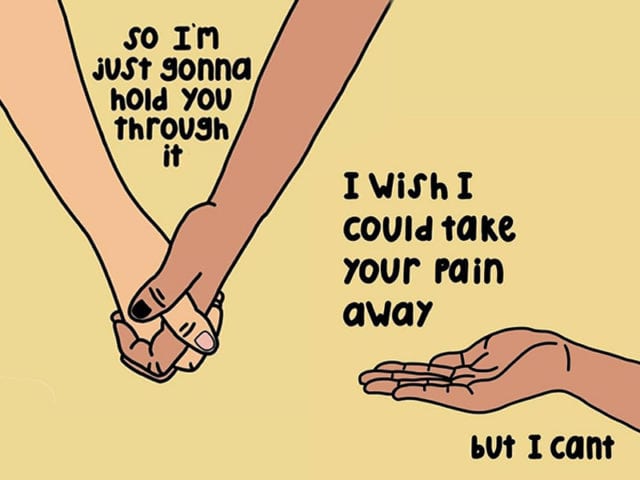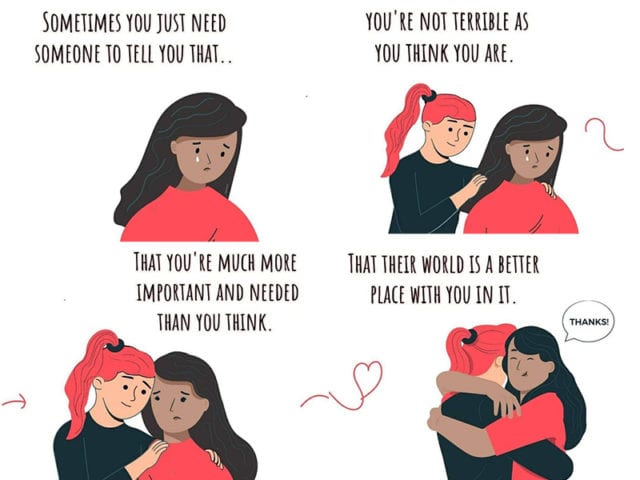Do you feel the urge to call your friend or connect with them as soon as something major happens? We often turn to our friends to discuss everything under the sun and more. From secrets to random thoughts, there is nothing a true friend doesn’t know. So do you approach them when you are facing mental health issues?
Your friendships are among the most valuable relationships you have. You gain in various ways from different friendships. This bond, that you choose outside of your gene pool, has a special place in your life. There is no judgement, just pure friendship.
Being there for someone who is having trouble with mental health can be quite a test, especially if the symptoms are suicidal or psychotic. A wrong word or sentence could be a trigger for them.
You need to talk to your friends and you want to listen when your friends want to talk to you. Your friends can keep you grounded and can help you get things in perspective. It is worth putting effort into maintaining your friendships and making new friends. Friends form one of the foundations of your ability to cope with the problems that life throws at you.
Positive Effects Of Friendship On Mental Health
Wondering why it feels great to vent out to your bestie? Friendships help us deal with issues and heal as well. Here are some positive effects of having great friends.
- Good friends can help you through traumatic events
- They can even help you to quit a bad habit you’ve picked up
- Friends can help increase your sense of belonging
- They help improve your self-confidence
- Strong friendships can help reduce stress and anxiety
Did You Know?
Studies show that those who enjoy close friendships over their teenage years have a lower rate of depression or anxiety later in life.

How Does Mental Ill Health Affect Friendships?
- People with more severe forms of mental illness have smaller social networks than others and have more family members than friends in their social circle.
- Those with smaller social networks, with fewer intimate relationships, find it more difficult to manage social situations.
- People with more long-lasting mental health problems often have relationships mainly with other people with mental health problems.
- Those with mental health problems often anticipate rejection from other people because of the stigma associated with mental health. They may avoid social contact, as a form of ‘self-stigma’.
How To Approach A Friend To Discuss Your Issues?
The first step is always the hardest but if you can do that, the rest follows with ease. If you have a mental health problem, you may have difficulty acknowledging it or feel ashamed about admitting it. There is no shame in mental health problems. Period.
You don’t need to tell your friends or anyone, but it certainly helps to open up to people you trust. So how do you tell your friend?
- Pick a friend whom you trust well.
- Choose a time and a place where you will both feel comfortable.
- Make sure you have the privacy to discuss this sensitive issue.
- Begin by stating what exactly the issue is. You can stick to the basic and not share intimate details.
- If talking face to face is not possible, call, text or write a letter.
- Some people react big, with tears or extreme emotions, so be prepared for that.
- You may choose to answer a few of their questions.
- Take it one step at a time.
Did You Know?
A report by the World Health Organisation (WHO) revealed that 7.5% of the Indian population suffers from some form of mental disorder.
How Should You Respond To Your Friend’s Mental Health Problems?
Being concerned comes naturally when a friend shares something so sensitive about themselves. The most vital thing you can do is tell them that they are still your friend. Making them feel that a mental health problem does not change the relationships in their life is of utmost importance.
Normalise the illness as if it’s a fracture. Be empathic, compassionate and keep assuring them of your love and trust. Make yourself reliable, so they can count on you, no matter what. Pamper them but draw a line of self-pity.
1. Be Open & Listen
If and when a friend reaches out to you, listen. If you are busy at the moment, pencil in some time and call/meet them. Find a peaceful place or sit in your bedroom to get some privacy. Remember to keep an open mind and let your friend talk their heart out.
2. Process Before Your Speak
Let the information sink in. Carefully listen and understand it all. Once you have the information, ask for a minute to process it instead of reacting spontaneously. It may cause an adverse effect. Form the sentences carefully before speaking. What you say can have a huge impact on your friend. Saying, “I am here for you” or “I want to help, tell me how” are great examples of what to say.
3. Reel In The Questions
It is natural to want to know everything and ask a thousand questions. But you need to be respectful of your friend’s mental state. They might not be open to answering your questions and that’s absolutely okay. Try presenting with one question and see the reaction you get. If they are willing to talk, be sensitive about it. Avoid questions like, “who have you shared this with” or “do you want me to take you to a psychiatrist”.
4. Offer Help Only If Asked
Avoid offering unsolicited advice. Most people who share such information either have a plan in place or are thinking about seeking professional help. In case your friend does ask for advice, stick to being a friend. Leave the medical conversation to the experts. You can suggest activities that make them happy. Going for a walk with them or playing a game of Badminton might help ease a part of the issue.
5. Encourage Them To Seek Help
Unless you are a certified therapist, you need to encourage your friend to seek professional help. A psychiatrist or psychologist can help them deal with their mental health problems in a defined and dignified manner. Motivate them to go for a session and offer to go along for emotional support. A number of support groups encourage participation from family and friends.
There are several books to guide you for the same. Even professionals guide the family members and friends in how to deal with people struggling from mental health concerns. However, the same solutions often don’t work every time and sometimes it would require creativity and improvisations.

5 More Ways You Can Help
Besides these major ways, you can be a good listener, a positive speaker and a ray of sunshine for your friend.
- Remind them that they’re incredibly strong
- Make them smile because laughter helps and heals
- Let them know they won’t always feel this way
- Plan their favourite activities and hobbies
- Invite them to outings, get-togethers and parties
Mental health problems don’t happen in a vacuum. They cause a ripple effect that touches everyone surrounding the person. Perhaps the most important thing you ever give your friend is attention. Just take them in. Listen to what they’re saying. Care about it. Friendship can be a positive space for your loved one going through tough times.

